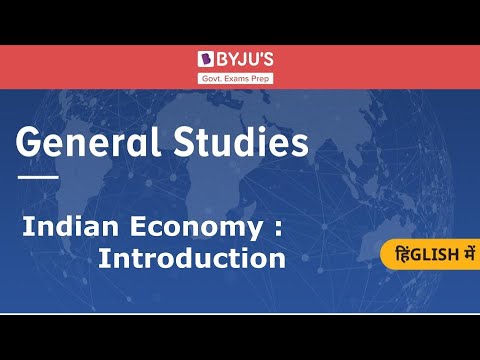Economy is one of the most important subjects covered by the syllabus of the UPSC Exam. This subject is often called as Economics or Indian Economy, while this is neither right or wrong but the appropriate word to use would be “Economic and Social Development” as it covers sustainable development, poverty alleviation etc. The UPSC Syllabus for Economy in Prelims and Mains covers economic and social factors affecting development, planning and resource use and different sectors of the economy etc. In this article, we will discuss the syllabus of Economy for the UPSC exam.
Economics Syllabus for UPSC Prelims:
The economics part of the Prelims Syllabus is officially termed Economic and Social Development. It covers the following topics:
- Development in sustainable ways
- Poverty and its alleviation
- Inclusive growth
- Demographics of India
- Initiatives in the social sector
- Government schemes
To read more on economics for UPSC, check out:
| UPSC Economy MCQs |
| Economics Notes for UPSC |
IAS aspirants are encouraged to read the detailed IAS Prelims Syllabus to be able to relate these topics to other parts of the syllabus. Economics for UPSC Prelims focuses more on the effects of various economic concepts and initiatives. Candidates should develop a conceptual understanding of these topics and learn to apply economic techniques to social problems to excel in this part of the exam.
Economics syllabus for UPSC Mains
The UPSC Mains syllabus for Economics can be divided into two parts:
- Economics for IAS General Studies
- Economics Optional Syllabus
These two parts, while having a significant overlap, have different areas of focus. We will discuss economics covered under general studies. This part covers the following topics:
- Indian Economy and issues related to economic planning, resource use, resource mobilization, growth of the economy and employment data.
- Inclusive growth and issues associated with inclusive growth
- Government budgeting
- Major crops of India and important cropping patterns used in various parts of India
- Different kinds of irrigation and systems in use such as canals and surface irrigation, drip irrigation etc.
- Issues related to marketing and transport of agricultural produce and constraints
- e- Technology to help farmers
- Direct and indirect farm subsidies and related issues
- Minimum support price
- Public Distribution System
- Objectives and importance
- Functions of Public Distribution System
- Advantages and disadvantages of PDS and its limitations
- Revamping and reorganization of the system
- Issues of buffer stocks and food security
- Technology missions related to food security
- Economics of rearing animals on farms
- Food processing industries and related industries in India
- Significance of these industries and their scope
- Location, upstream and downstream requirements of food processing and related industries.
- Supply chain management
- Land reforms in India
- Liberalisation and its effects on Indian industry
- Changes in industrial policy
- Effects of these changes on the growth of industry
- Infrastructure: Railways, Airports, Roads and Waterways, storage facilities etc.
- Models of investment

Candidates can go through a few relevant topics on economics given below-
As we can deduce from the list of topics, economics for General Studies in Mains has a similar focus to the Prelims syllabus on the same subject. There is less emphasis on theoretical and more on applied economics. Candidates should learn key concepts related to the Indian economy and post liberalisation trends. It is also a good idea to read some case studies related to the topics in the syllabus. Reading the Economic Survey is also a must while preparing for this subject.
UPSC Economics Optional Syllabus:
UPSC Economics Optional Syllabus:-Download PDF Here
| Candidates can enhance their UPSC exam preparation by attempting UPSC Previous Years Question Papers now!!
To complement your preparation for the upcoming exam, check the following links: |
The above details would help candidates prepare for UPSC 2023.
The IAS economics syllabus for optional papers deals with basic economic concepts, theoretical and applied economics and major economic changes in India pre and post-independence. The optional papers delve deep into economics as a subject. Candidates should understand key economic concepts in detail and should practice the mathematical concepts used in economics to excel in optionals. Economics syllabus for optional covers the following topics:
- Advanced Microeconomics
- Advanced Macroeconomics
- Banking and finance
- International Economics
- Growth and Development
- Post-independence economics in India
- Pre-liberalisation
- Post-liberalisation
Candidates should try to link various events going on in the field of economics and apart from this focus should be given on various social sector schemes related to education, health and sanitation. After going through the economics questions asked in the UPSC exam, it requires a good understanding of the topic in the context of current events. So IAS aspirants should focus on those national and international issues, bilateral relations, treaties, etc that affect the basic structure of the Indian economy. Most of the questions asked in the exam are tricky. It is advisable for candidates to prepare extensively on these questions as insufficient attention may lead to erroneous interpretation and subsequently, lost marks. All topics under this section need to be covered, while emphasizing those topics and issues which have intense effects on the Indian Economy.
You can check out strategy to follow for UPSC Economics in the following articles:
| Strategy for Economics Optional for UPSC |
| Syllabus and Strategy for Economics – Prelims, Mains & Optional |
| UPSC Civil services Preliminary Examination: Strategies to cover Economics |
To read more on IAS preparation, please visit:

Comments